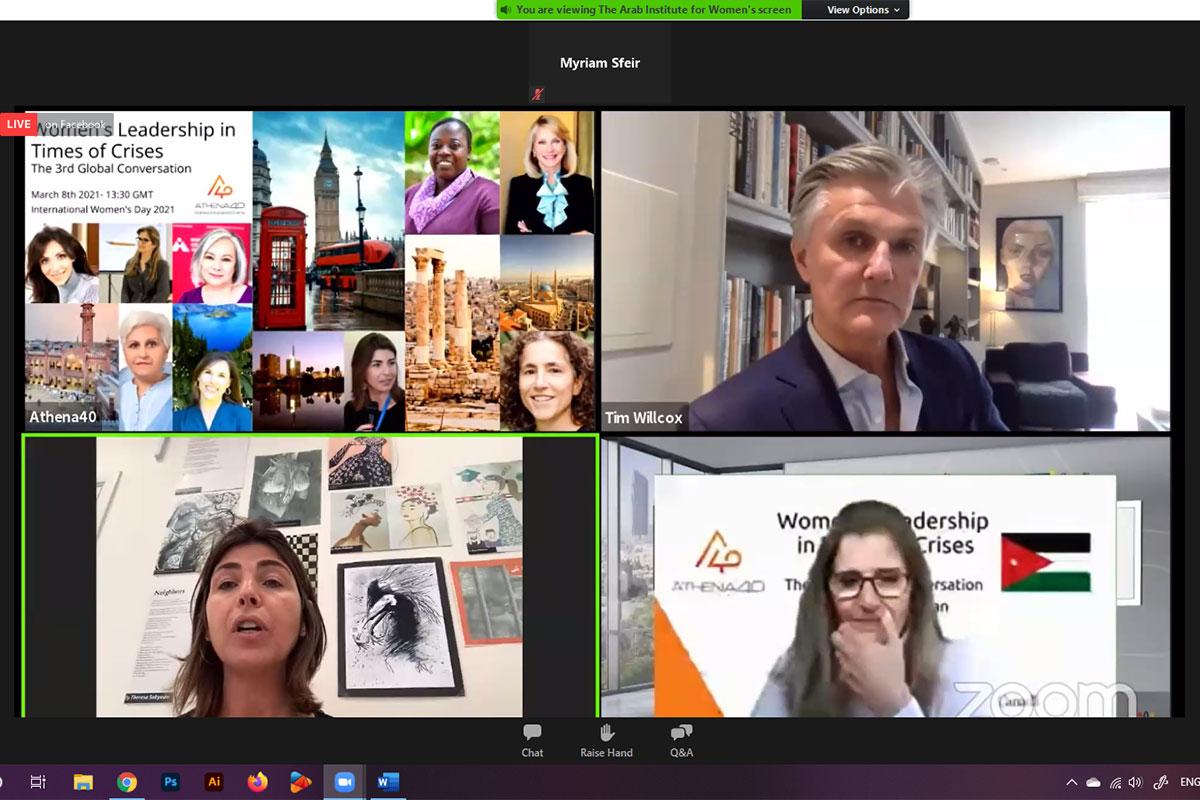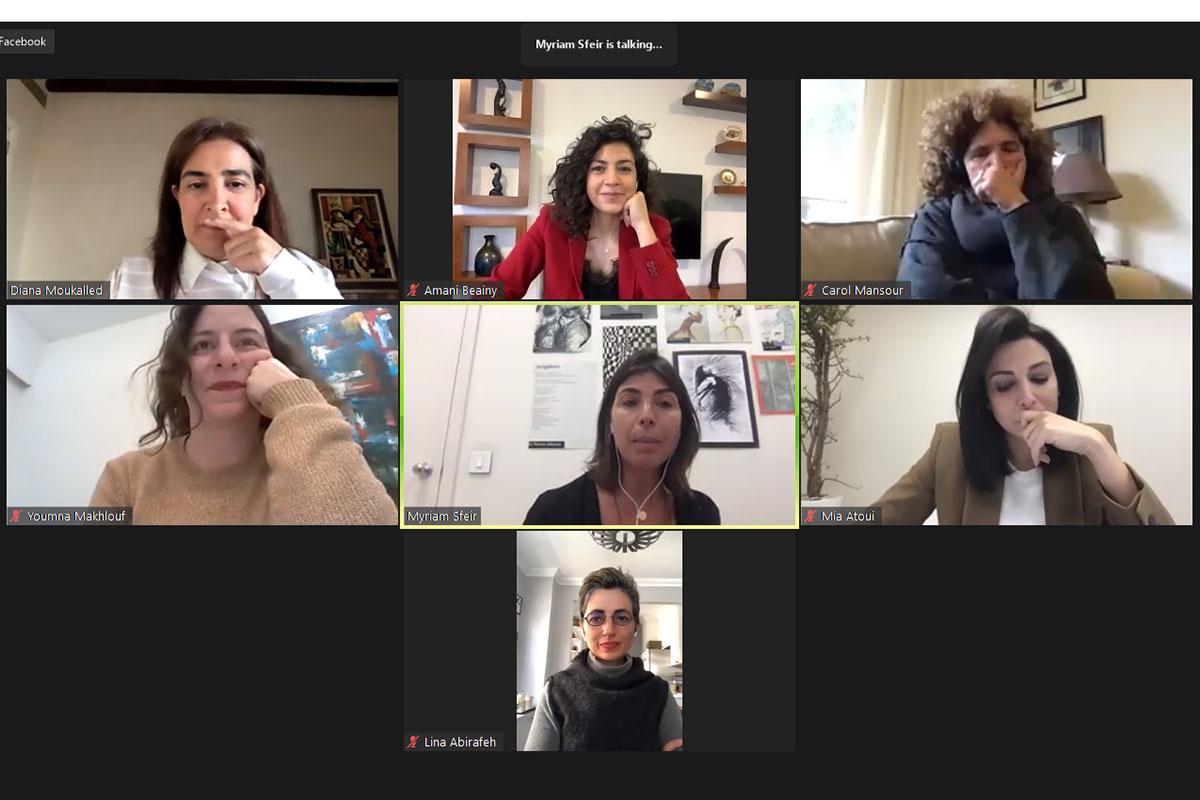Female Leadership in Times of Crises
AiW at LAU spotlights the work of five women as they responded to tragedy.
Marking International Women’s Day, the Arab Institute for Women (AiW) at LAU co-hosted one of nine simultaneous panels from Karachi, Oregon, California, London, Zagreb, Lagos, Nairobi, Amman and Beirut for the Third Athena 40 Global Conversation, this year themed Women’s Leadership in Times of Crises.
The Beirut panel, moderated by AiW Director Myriam Sfeir, featured five Lebanese women who have been pushing the boundaries in mental health, environmental activism, law, documentary filmmaking and journalism.
They joined over 60 speakers who connected from all around the world to share their stories and give an account of their endurance in a global pandemic and various local crises. The panels were centrally moderated by the BBC’s Tim Willcox.
In her introductory remarks, AiW Executive Director Lina Abirafeh urged attendees not to wish women a “happy” International Women’s Day. Referring to the year 1911, when women – and men – first took to the streets to demand rights for women to work, vote and hold public office, Dr. Abirafeh pointed out that “here we are, 110 years later, still making very similar demands – how can I possibly be happy about that?”
In Lebanon, the problems are more pronounced as the country wrestles with economic insecurities, the aftermath of a massive explosion, a pandemic and civil unrest – challenges that seem to be on the rise in 2021.
“Women and marginalized groups have been forced to enter the informal economy, and as they took on a further burden of care, their mental health deteriorated, and they face heightened forms of violence as a result of these insecurities,” explained Sfeir.
Clinical Psychologist and Co-Founder of Embrace Lebanon Mia Atoui spoke about how her organization combines both the socioeconomic and medical approaches to mental health in responding to the multiple crises.
As mental health concerns steadily escalated, operating a suicide hotline – the region’s first – meant that the organization’s staff and volunteers had to be constantly prepared for the worst. “Embrace is a women-led organization, and this has helped us because we are naturally proactive, resourceful and plan in advance,” said Atoui.
But this crucial job is in itself taxing. “Our operators, mostly Lebanese youth, are suffering from difficulties of their own, and they have been forced to put aside all their anxieties to pick up the calls. This has been one of the most challenging factors so far,” admitted Atoui.
Identifying as a feminist first, Legal Researcher Environmental Activist Amani Beaini gave context to her “career turning point” – saving the Bisri Valley.
As plans moved ahead to construct a controversial water dam in the Bisri area and knowing that this would have a detrimental impact on the environment, Beaini created a Facebook page highlighting local opposition to the project. Combining the efforts of Lebanon’s Eco Movement and various civil society organizations, the campaign expanded to a national scale and succeeded in halting international funds to build the dam. “Through our efforts and continuous struggles, we managed to save one of our most remarkable cultural heritage sites from a crime,” declared Beaini.
Another career-defining moment struck for Lawyer and Researcher at Legal Agenda Youmna Makhlouf, as she was defending a woman during a divorce hearing. When her client sat idle as she listened to her husband make his case in front of the judges, Makhlouf realized that her job required more than just speaking up on behalf of other women.
“My role was to lead women into the battlefield and equip them with the right weapons,” she said. “But at the end of the day it was their fight and they had to conjure their own strength to win it.”
Amplifying women’s voices had become an undertaking for Award-Winning Filmmaker and Founder of Forward Film Production Carol Mansour for more than two decades now. Working with the underprivileged, from women and child refugees to migrant domestic workers, she has focused on showing them in a new light through documentaries.
“It’s up to us to keep telling the stories, to let women’s voices be heard, while staying humble and being kind to one another,” noted Mansour.
Journalist and Co-Founder of Daraj Media Diana Moukalled took on a similar task since the mid-90s, when “social media did not yet exist” and first-person narratives were not as widespread. Rebelling against her own traditional upbringing, “I came to realize that women should not suffer from what I thought was normal but in fact wasn’t.”
From Lebanon to Jordan, Iraq, Yemen, and Afghanistan, Moukalled set out to give voices to women who were never-before heard. “Telling the stories of those who were hurt, impoverished or even killed is crucial and I will never stop doing it for as long as I live.”
Despite Lebanon’s multilayered crises, the five women agreed that perhaps there is hope when more women meet and work with other women who have risen to overcome these challenges.
Promising to always showcase the important work that panelists have done and continue to do through AiW, Sfeir added that “the future is bright with the likes of all of you.”

